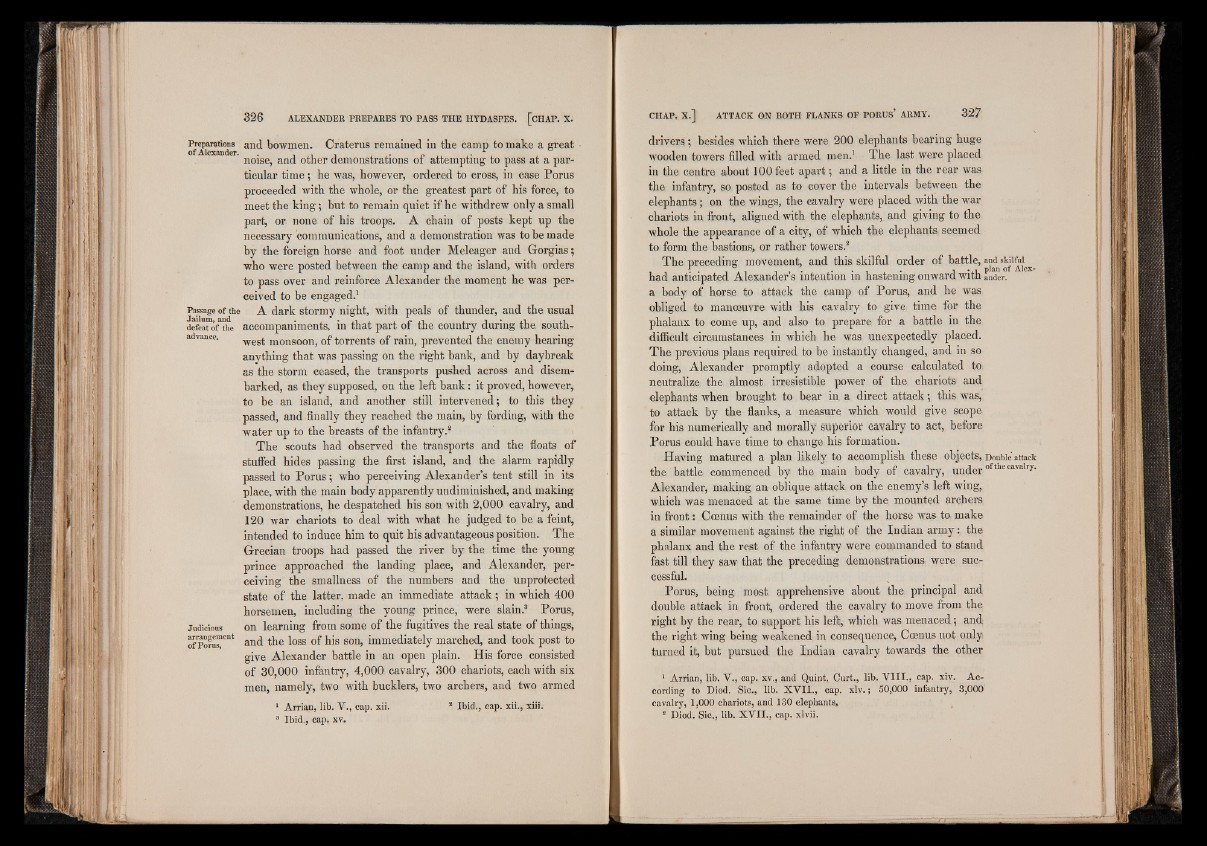
Preparations and bowmen. Craterus remained in the camp to make a great
of Alexander. . , . , . „ . x noise, and other demonstrations ol attempting to pass at a par-
ticular time; he was, however, ordered to cross, in case Porus
proceeded with the whole, or the greatest part of his force, to
meet the king; but to remain quiet if he withdrew only a small
part, or none of his troops. A chain of posts kept up the
necessary communications, and a demonstration was to be made
by the foreign horse and foot under Meleager and Gorgias;
who were posted between the camp and the island, with orders
to pass over and reinforce Alexander the moment he was perceived
to be engaged.1
Passage of the A dark stormy night, with peals of thunder, and the usual
defeatof^tiie accompaniments, in that part of the country during the south-
advance. ■wesj; monsoon, of torrents of rain, prevented the enemy hearing
anything that was passing on the right bank, and by daybreak
as the storm ceased, the transports pushed across and disembarked,
as they supposed, on the left bank: it proved, however,
to be an island, and another still intervened; to this they
passed, and finally they reached the main, by fording, with the
water up to the breasts of the infantry.®
The scouts had observed the transports and the floats of
stuffed hides passing the first island, and the alarm rapidly
passed to Porus; who perceiving Alexander’s tent still in its
place, with the main body apparently undiminished, and making
demonstrations, he despatched his son with 2,000 cavalry, and
120 war chariots to deal with what he judged to be a feint,
intended to induce him to quit his advantageous position. The
Grecian troops had passed the river by the time the young
prince approached the landing place, and Alexander, perceiving
the smallness of the numbers and the unprotected
state of the latter, made an immediate attack; in which 400
horsemen, including the young prince, were slain.3 Porus,
judicious on learning from some of the fugitives the real state of things,
— en‘ and the loss of his son, immediately marched, and took post to
give Alexander battle in an open plain. His force consisted
of 30,000 infantry, 4,000 cavalry, 300 chariots, each with six
men, namely, two with bucklers, two archers, and two armed
1 Arrian, lib. V., cap. xii. * Ibid., cap. xii., xiii.
3 Ibid., cap, xv.
drivers; besides which there were 200 elephants bearing huge
wooden towers filled with armed men.1 The last were placed
in the centre about 100 feet apart; and a little in the rear was
the; infantry, so posted as to cover the intervals between the
elephants; on the wings, the cavalry were placed with the war
chariots in front, aligned with the elephants, and giving to the
whole the appearance of a city, of which the elephants seemed
to form the bastions, or rather towers.®
The preceding movenient, and this, skilful order of battle, and skilful
• • -l Ai • j • .-i plan o f Alex- had anticipated Alexander s intention m hastening onward with ander.
a body of horse to attack the camp of Porus, and he was
obliged to manoeuvre with his cavalry to give time for the
phalanx to come up, and also to prepare for a battle in the
difficult circumstances in which he was unexpectedly placed.
The previous plans required to be instantly changed, and in so
doing, Alexander promptly adopted a course calculated to
neutralize the almost irresistible power of the chariots and
elephants when brought to bear in a direct attack; this was,
to attack by the flanks, a measure which would give scope
for his numerically and morally superior cavalry to act, before
Porus could have time to change his formation.
Having matured a plan likely to accomplish these objects, Double attack
the battle commenced by the main body of cavalry, under ofthecavalry-
Alexander, making an oblique attack on the enemy’s left wing,
which was menaced at the same time by the mounted archers
in front: Coenus with the remainder of the horse was to make
a similar movement against the right of the Indian army: the
phalanx and the rest of the infantry were commanded to stand
fast till they saw that the preceding demonstrations were successful.
Porus, being most apprehensive about the principal and
double attack in front, ordered the cavalry to move from the
right by the rear, to support his left, which was menaced; and
the right wing being weakened in consequence, Coenus not only
turned it, but pursued the Indian cavalry towards the other
1 Arrian, lib. V., cap. xv., and Quint. Curt., lib. V I I I ., cap. xiv. According
to Diod. Sic., lib. X V I I ., cap. x lv .; 50,000 infantry, 3,000
cavalry, 1,000 chariots, and 130 elephants,
2 Diod. Sic., lib. X V I I ., cap. xlvii.